Edited by mbhcsf at 15-10-2017 11:48 PM
Salam,
dari
http://www.bbc.com/news/world-europe-41567391
Why did Vikings have 'Allah' embroidered into funeral clothes?
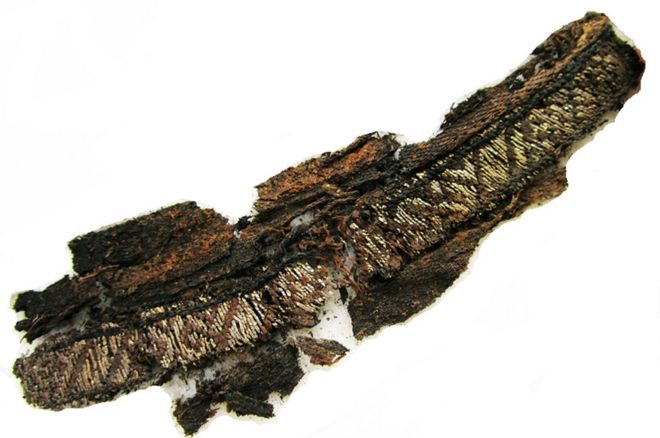 I I
One of the excavated fragments made from fine silk and silver thread discovered at the two Swedish sites, Birka and Gamla Uppsala
Researchers in Sweden have found Arabic characters woven into burial costumes from Viking boat graves. The discovery raises new questions about the influence of Islam in Scandinavia, writes journalist Tharik Hussain.
They were kept in storage for more than 100 years, dismissed as typical examples of Viking Age funeral clothes. But a new investigation into the garments - found in 9th and 10th Century graves - has thrown up groundbreaking insights into contact between the Viking and Muslim worlds. Patterns woven with silk and silver thread have been found to spell the words "Allah" and "Ali". The breakthrough was made by textile archaeologist Annika Larsson of Uppsala University while re-examining the remnants of burial costumes from male and female boat and chamber graves originally excavated in Birka and Gamla Uppsala in Sweden in the late 19th and mid-20th centuries. She became interested in the forgotten fragments after realising the material had come from central Asia, Persia and China. Larsson says the tiny geometric designs - no more than 1.5cm (0.6in) high - resembled nothing she had come across in Scandinavia before. "I couldn't quite make sense of them and then I remembered where I had seen similar designs - in Spain, on Moorish textiles."
Unlocking a puzzle
Larsson then realised she was not looking at Viking patterns at all but ancient Arabic Kufic script. There were two words that kept recurring. One of them she identified with the help of an Iranian colleague. It was the name "Ali" - the fourth caliph of Islam. But the word next to Ali was more difficult to decipher.
Read more on the Vikings
To unlock the puzzle, she enlarged the letters and examined them from all angles, including from behind. "I suddenly saw that the word 'Allah' [God] had been written in mirrored lettering," she says. 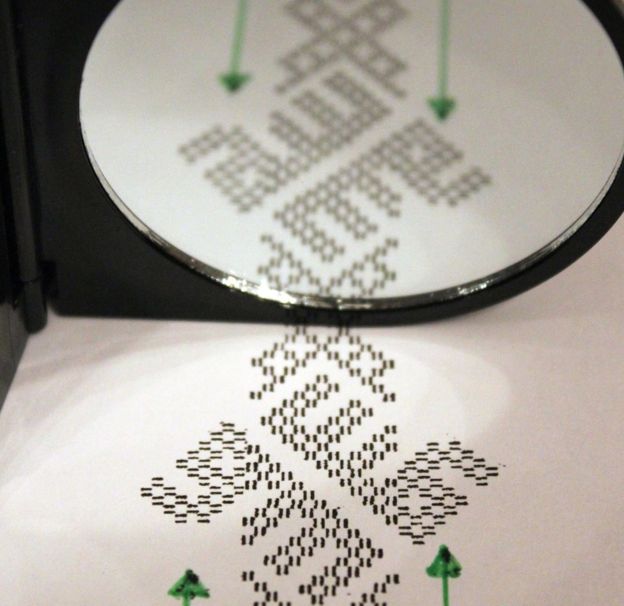 Image caption[size=0.8125]Enlarging the patterns and looking at the reflection in a mirror revealed the word 'Allah' (God) in Arabic Image caption[size=0.8125]Enlarging the patterns and looking at the reflection in a mirror revealed the word 'Allah' (God) in ArabicLarsson has so far found the names on at least 10 of the nearly 100 pieces she is working through, and they always appear together. The new find now raises fascinating questions about the grave's occupants. "The possibility that some of those in the graves were Muslim cannot be completely ruled out," she says. "We know from other Viking tomb excavations that DNA analysis has shown some of the people buried in them originated from places like Persia, where Islam was very dominant. "However, it is more likely these findings show that Viking age burial customs were influenced by Islamic ideas such as eternal life in paradise after death." 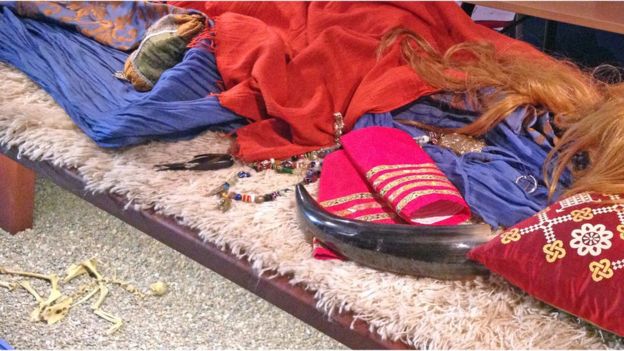
A museum display gives a sense of what the Viking woman's boat grave in Gamla Uppsala may have looked like - similar to the tombs the fragments were found inHer team is now working with the university's department for immunology, genetics and pathology to establish the geographic origins of the bodies dressed in the funeral clothes.
Historic firstTwo years ago, researchers re-examined a silver ring from a female tomb at Birka and found the phrase "for Allah" inscribed on the stone. Again the text was Kufic, developed in the Iraqi town of Kufah in the 7th Century - one of the first Arabic scripts used to write down the Koran. What makes Larsson's discovery so interesting is that it is the first time historic items mentioning Ali have ever been unearthed in Scandinavia. 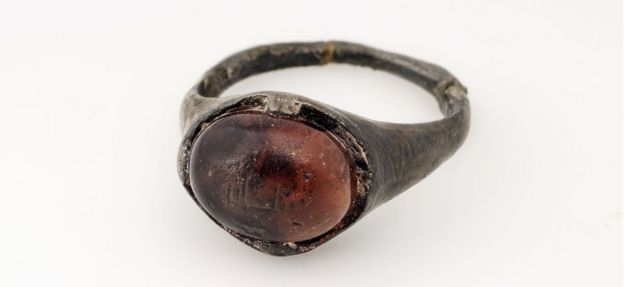
GABRIEL HILDEBRAND/ THE SWEDISH HISTORY MUSEUMImage caption
A Viking ring with a Kufic inscription saying "for Allah" was found inside a 9th Century woman's grave in Birka two years ago"The name Ali is repeated again and again beside Allah," she says. "I know Ali is highly revered by the largest Muslim minority group, the Shia, and have wondered if there is a connection." Ali was the cousin and son-in-law of the Prophet Muhammad, having married his daughter Fatima. He also became the fourth leader of the Muslim community after Muhammad died. Although both Sunnis and Shia revere Ali as an important companion of Muhammad, he has elevated status amongst the Shia, who see him as the Prophet's spiritual heir. "The use of Ali does suggest a Shia connection," says Amir De Martino, programme leader of Islamic studies at the Islamic College in London. "But without the phrase 'waly Allah' accompanying the name - meaning 'friend of Allah' - this would not be from mainstream Shia culture and might just have been copied wrongly from something that was," adds De Martino, who is also the chief editor of Islam Today, a British Shia magazine. "The pattern suggests Ali is being equated with Allah, and therefore there is a slim possibility it has some connection to very early, extreme, mystical fringe movements who believed in this "But more likely it is a wrongly copied pattern."
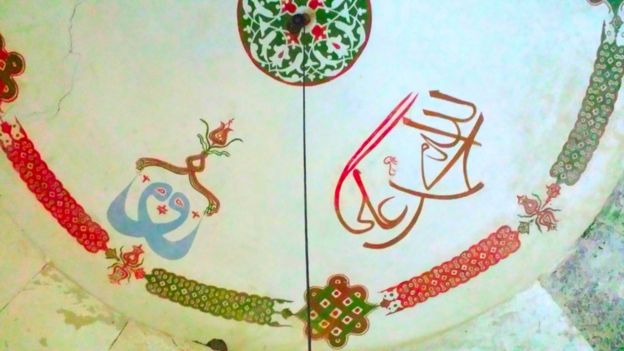
Inscriptions on the ceiling of an Alevi mausoleum in Bulgaria feature - on the right - the names Allah, Muhammad and Ali written in legible, simple Arabic while on the left there is a blue mystic pattern with the three names interlockedThe names Allah and Ali are often represented in enigmatic patterns inside the tombs and books of mystical Shia sects such as the Alevis and Bektashis to this day, but always they are accompanied by the name Muhammad. These can sometimes include mirrored script. But unlike Larsson's find, these examples usually include both the name depicted the correct way around and the reflection. For Larsson though, her discovery offers much promise for the future. "Now that I am looking at Viking patterns differently, I am convinced I will find more Islamic inscriptions in the remaining fragments from these excavations, and other Viking era textiles. "Who knows? Maybe they appear in non-textile artefacts too." Tharik Hussain is a London-based freelance journalist, travel writer and broadcaster who specialises in Muslim heritage.
|